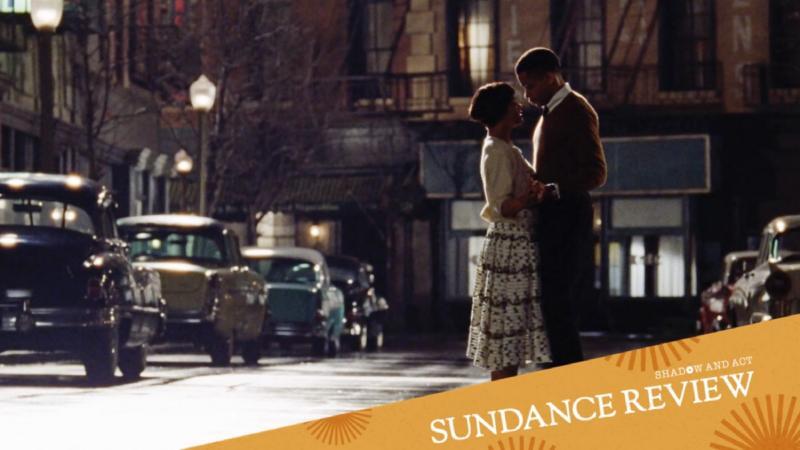Black people have very few opportunities to see ourselves in sweeping romantic dramas like the films that used to dominate Old Hollywood. We’ve certainly had movies like Love Jones and Stella Meghie’s forthcoming romantic drama, The Photograph. However, outside of Diana Ross’ Mahogany and Lady Sings the Blues, films in the same romantic vein as Casablanca, An Affair to Remember and It Happened One Night, or even contemporary period pieces like The Notebook, have largely been reserved for white actors and storytellers within the tight confines of American Cinema’s studio system. Now, we have Sylvie’s Love.
Set in the summer of 1957, writer and director Eugene Ashe’s aesthetically stunning Sylvie’s Love is a sweeping old-fashioned romantic drama about missed moments, extraordinary love and staying true to yourself. Robert (Nnamdi Asomugha), a quiet but brilliant saxophonist, stumbles into Sylvie’s (Tessa Thompson) world on a sweltering summer day in Harlem.
While Robert and his group, the “Dickie Brewster Quartet,” are gaining traction in the music scene, Sylvie is stuck. With her fiancé Lacy (Alano Miller) overseas in Korea, the aspiring television producer spends her days watching I Love Lucy and Father Knows Best in her father’s record shop. She entertains herself by lounging with her cousin Mona (Aja Naomi King) on the record shop’s rooftop and dodging her bougie mother’s lessons on being a lady.
From the moment Sylvie and Robert meet there is a spark. They experience that sizzle and connection that draws them to one another like magnets. The pair embark on a whirlwind summer romance, full of late-night dancing and stolen kisses. Yet, Sylvie’s engagement ring is a constant reminder of their reality, especially when Robert and the quartet receive an opportunity to take their music to Paris.
The lush look of Sylvie’s Love cannot be overstated. From the production design to the costuming, every single frame looks like a high-definition postcard of a glittering Harlem of the 1950s and 1960s. However, despite the cinematography and the subdued brilliance of both Thompson and Asomugha, the narrative never lives up to the film’s immense beauty.
Though Robert and Sylvie are sweet together, the plot never accelerates enough to allow the actors to deliver enough sensuality and sexiness to move past their initial spark and into a feeling of longing. In fact, the first time Sylvie and Robert dance together at the Blue Morocco, the club where Robert plays, is the first time the audience experiences a deep yearning between the two. That moment comes at least 30 mins into the narrative. Things don’t actually elevate until the second half of the film when the characters cross paths once more in 1962. Though Sylvie and Robert’s motivations and desires are clear, the plot falls into a pattern of predictability, leaving little room for any thwarting of expectations or climatic shifts.
There is a ton of talent in this film, from King as Sylvie’s freedom fighter cousin to Eva Longoria, who plays Dickie Brewster’s wife Carmen, and gives a stellar musical performance toward the middle of the film. Lance Reddick also shines as Sylvie’s father, Mr. Jay, a record shop owner and former musician who thinks he can fix any broken equipment he finds on the street. However, because we never learn much about Mona — other than her work as a Civil Rights Activist and Longoria’s Carmen exists mostly in the background of the quartet, Sylvie’s Love feels very much like a missed opportunity for these women.
Opening with Nancy Wilson crooning, “The Nearness Of You,” Sylvie’s Love is a film that has romance, beauty and the delights and wonder of Black life. Reigning in the film’s lengthy 114-minute runtime might help to elevate the performances while also giving the relationship between Sylvie and Robert the tension-filled desire needed to make this romance film genuinely magical. Still, the film has terrific bones. Including Fabrice Lecomte’s incredible musical score, the year and a half Asomugha spent mastering the saxophone, and the references to John Coltrane and Motown, among others. Also, there is something to be said about a film that might just give a Black woman everything she ever wanted.
Sylvie’s Love premiered at the Sundance Film Festival on January 27, 2020.
READ MORE:
‘The 40-Year-Old Version’ Is An Ode To Black Womanhood And Putting Yourself On
‘Bad Hair’ Has A Lot To Say But Never Says It [REVIEW]
‘Charm City Kings’: Coming-Of-Age Drama On Black Dirt Bike Riders Gets Release Date
Sundance 2020 Includes ‘Zola,’ ‘Charm City Kings,’ ‘Sylvie’s Love’ And More
Aramide A. Tinubu is a film critic, consultant and entertainment editor. As a journalist, her work has been published in EBONY, JET, ESSENCE, Bustle, The Daily Mail, IndieWire and Blavity. She wrote her master’s thesis on Black Girlhood and Parental Loss in Contemporary Black American Cinema. She’s a cinephile, bookworm, blogger and NYU + Columbia University alum. You can find her reviews on Rotten Tomatoes or A Word With Aramide or tweet her @wordwitharamide
From Harlem to Hollywood, get the Black entertainment news you need in your inbox daily.

